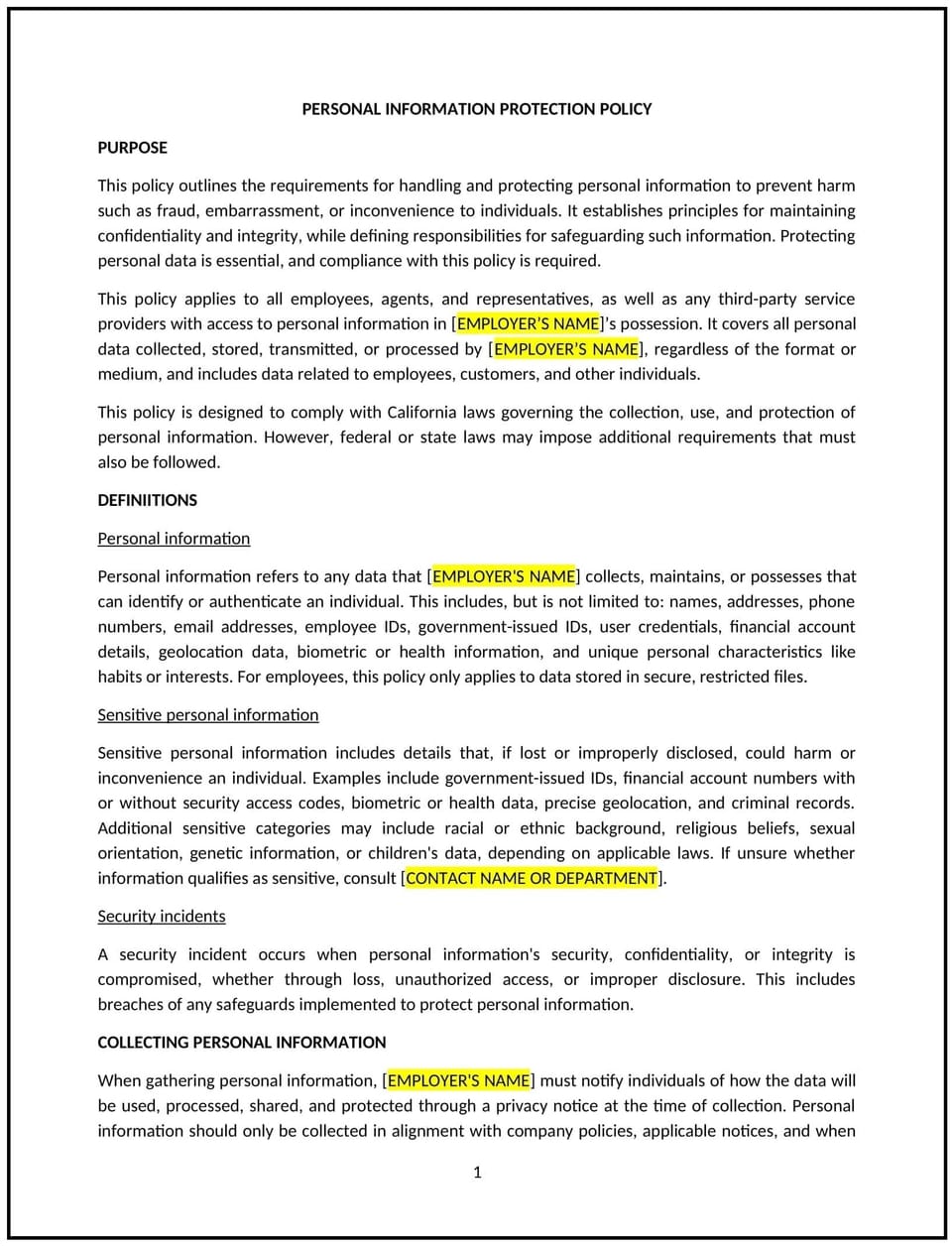Personal information protection policy (California): Free template

Personal information protection policy (California)
In California, a personal information protection policy provides businesses with guidelines to safeguard sensitive employee, customer, and third-party information. This policy supports compliance with California-specific privacy laws, such as the California Consumer Privacy Act (CCPA) and the California Privacy Rights Act (CPRA).
This policy outlines the business’s practices for collecting, storing, and sharing personal information, as well as procedures for responding to data breaches. By implementing this policy, California businesses can protect privacy, maintain trust, and reduce legal and reputational risks.
How to use this personal information protection policy (California)
- Define personal information: Clearly specify the types of personal data covered under the policy, such as names, Social Security numbers, and financial details.
- Establish access controls: Limit access to personal information to authorized personnel and implement robust authentication measures.
- Outline data handling practices: Provide guidelines for securely collecting, storing, and transferring personal information to minimize risks.
- Communicate breach response steps: Detail the procedures for identifying, reporting, and mitigating data breaches in compliance with California law.
- Train employees: Offer training on privacy and data protection to ensure employees understand their responsibilities.
Benefits of using this personal information protection policy (California)
This policy offers several advantages for California businesses:
- Supports compliance: Ensures adherence to California privacy laws, such as CCPA and CPRA.
- Protects sensitive data: Safeguards personal information from unauthorized access, misuse, or breaches.
- Enhances trust: Demonstrates the business’s commitment to privacy and security, fostering confidence among employees and customers.
- Reduces risks: Minimizes potential legal liabilities and reputational damage associated with data mishandling.
- Promotes accountability: Clarifies roles and responsibilities for protecting personal information.
Tips for using this personal information protection policy (California)
- Reflect California-specific laws: Address requirements under CCPA, CPRA, and other relevant regulations.
- Implement secure systems: Use encryption, firewalls, and other technologies to protect sensitive data from unauthorized access.
- Conduct regular audits: Periodically review data handling practices to ensure compliance and identify areas for improvement.
- Encourage transparency: Communicate privacy practices clearly to employees, customers, and other stakeholders.
- Review regularly: Update the policy to reflect changes in California laws, business operations, or technological advancements.
Q: How does this policy benefit the business?
A: This policy supports compliance with California privacy laws, protects sensitive data, and enhances trust among employees and customers.
Q: What types of personal information are covered under this policy?
A: The policy applies to data such as names, contact details, Social Security numbers, financial information, and other sensitive personal data.
Q: How does this policy support compliance with California laws?
A: The policy reflects CCPA and CPRA requirements, ensuring lawful handling and protection of personal information.
Q: What steps should employees take to safeguard personal information?
A: Employees should follow access control protocols, use secure systems, avoid sharing credentials, and report any suspected data breaches.
Q: How can the business address a data breach?
A: The business should follow the breach response procedures outlined in the policy, including containment, notification, and remediation.
This article contains general legal information and does not contain legal advice. Cobrief is not a law firm or a substitute for an attorney or law firm. The law is complex and changes often. For legal advice, please ask a lawyer.


